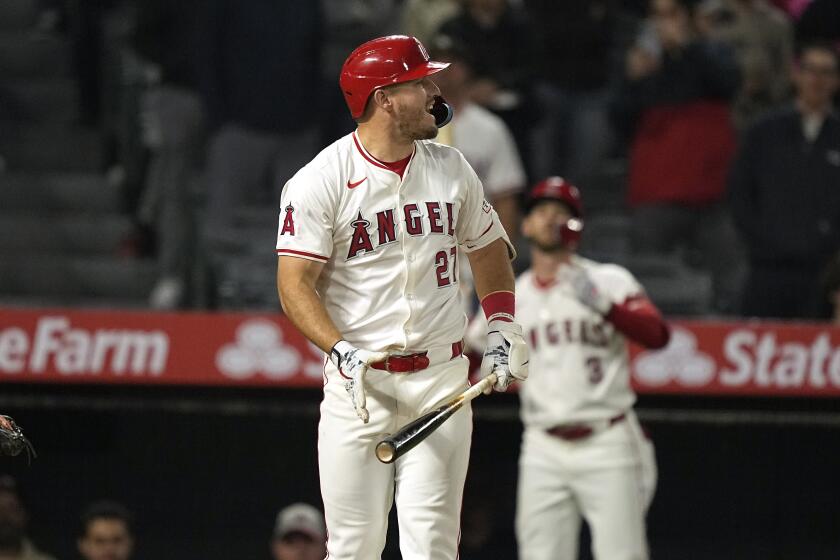Fernando Rodney will clock in as setup man for Angels
Mike Butcher has a nickname for the radar gun in Angel Stadium. “The Humbler,” the pitching coach calls it, because unlike those in cities such as Seattle and Baltimore, its readings do not seem inflated.
“I think our gun is accurate,” Butcher said. “A lot of them are very high, and it gives you a false sense of security. You think you’re throwing 98 mph, and you’re throwing 91-92.”
So when Fernando Rodney, who was closing games for the Detroit Tigers, hit 100 mph in Anaheim last August, Butcher knew the right-hander’s velocity was more than legitimate.
“I remember thinking, ‘Wow, he was really blowing smoke,’ ” Butcher said. “He may have been the only guy who hit 100 mph in our stadium all year. I think [Boston’s] Daniel Bard was the only other one.”
Rodney’s gun readings aren’t always that eye-popping -- his fastball usually resides in the 96-mph range -- but he combines it with a dipping, darting, 80-mph changeup that has given the 33-year-old closer-quality stuff.
The Angels did not sign Rodney to a two-year, $11-million deal to close, though.
After converting 37 of 38 save opportunities for the Tigers in 2009, Rodney is expected to share setup duties with Scot Shields and Kevin Jepsen and close on a fill-in basis when Brian Fuentes is down.
“It doesn’t matter what my role is -- I’m excited to be a setup man instead of a closer,” Rodney, a native of the Dominican Republic, said in his deep, monotone voice. “To me, the eighth and ninth innings are the same. They’re both big innings.”
To Butcher, these are soothing words. The Angels like their bullpen depth, with Fuentes, Rodney, Shields, Jepsen and Jason Bulger, but it can be disruptive to have a disgruntled setup man pining to be a closer.
“That tells me the guy wants to pitch in a winning organization,” Butcher said, when told of Rodney’s quote. “If you go into a game, you’re closing whatever inning it is.
“A lot of guys take pride in cleaning up the seventh with guys on base, which is a really important part of the game. That’s the mentality we want, and if Fernando believes that, if he wants that, he’ll fit in perfectly well here.”
The move from Tigers closer to Angels setup man would seem to be a demotion for Rodney, a standout eighth-inning specialist during Detroit’s run to the World Series in 2006. A closer look at Rodney’s 2009 season reveals why he didn’t receive many offers to close.
Though he led the American League in save percentage (97.4) and games finished (65), Rodney had a 4.40 earned-run average, highest among AL relievers with 20 or more saves. He had a 6.08 ERA in non-save situations.
He held hitters to a .207 average with runners in scoring position, but his strikeouts (61) were a little low and his walks (41) a little high for a power pitcher who threw 75 2/3 innings.
Another potential red flag: Rodney has been on the disabled list five times since 2004 and missed large chunks of 2007 and 2008 because of shoulder tendinitis.
But what really punctured Rodney’s market value was his final month of 2009, when he went 0-2 with an 8.00 ERA. He gave up 16 earned runs and 23 hits, including three homers, walked 14 and struck out seven in 18 innings. He had eight saves, but several came on narrow escapes.
The capper came in Detroit’s one-game playoff for the AL Central title against the Minnesota Twins, when Rodney gave up the game-tying run after giving up a leadoff triple to Michael Cuddyer in the 10th inning and the winning run in the 12th inning of a 6-5 loss.
“Maybe I was a little tired because I threw a lot of innings,” Rodney said of that final month. “And the game we lost in Minnesota, I don’t know, I think that affected me [in free agency]. People remember that last game.”
Rodney reported to camp with some soreness in his shins, but the Angels don’t expect his psyche to be bruised. A seven-year veteran with a career 4.28 ERA, Rodney has a reputation for being fearless, challenging hitters and attacking the strike zone.
He has been known to give up a leadoff hit or walk while throwing 91 mph to the first batter and then crank up his fastball to 96 mph for the next hitter.
“You have to have the adrenaline inside,” Rodney said. “Sometimes you have to put a little more on the fastball.”
Angels center fielder Torii Hunter, the former Twins star who battled Rodney for years in the AL Central, saw this firsthand.
“Oh, man, I’m glad he’s on my side,” Hunter said. “He can throw 99 when he feels like it. Guys like that you don’t want to face, because he could be throwing 92-93, trying to throw strikes, then he’ll blow it by you at 99.
“And his changeup is like a split-fingered fastball; it’s his best pitch.”
Considering his short and stocky frame -- Rodney is listed at 5 feet 10 and 215 pounds -- it seems remarkable he is able to generate the velocity he does.
But Rodney built up leg strength running in the mountains near his home in Samana on the Dominican’s north coast, and he has always been blessed with sound mechanics.
“He’s strong as an ox, he creates incredible arm speed, and he gets through the ball the right way,” Butcher said.
Rodney keeps things simple. He has never been tempted to add a third pitch to his fastball and changeup.
“Sometimes when you have two pitches, you don’t have to think too much,” he said. “Mariano Rivera has one pitch, and he’s still dominant. If you have good location and keep the ball down, you’ll get a lot of ground balls. That’s more important.”
Rodney’s command wavered last September; regaining it will be a top priority for him this spring.
“I think every pitcher is going to go through some spots when his stuff is not as locked in,” Manager Mike Scioscia said. “Fernando’s stuff is real. He has as good a deception as anyone in our league, and maybe baseball. When you combine that with the power arm he has, we look for some big things from him.”
mike.digiovanna
@latimes.com
More to Read
Go beyond the scoreboard
Get the latest on L.A.'s teams in the daily Sports Report newsletter.
You may occasionally receive promotional content from the Los Angeles Times.






